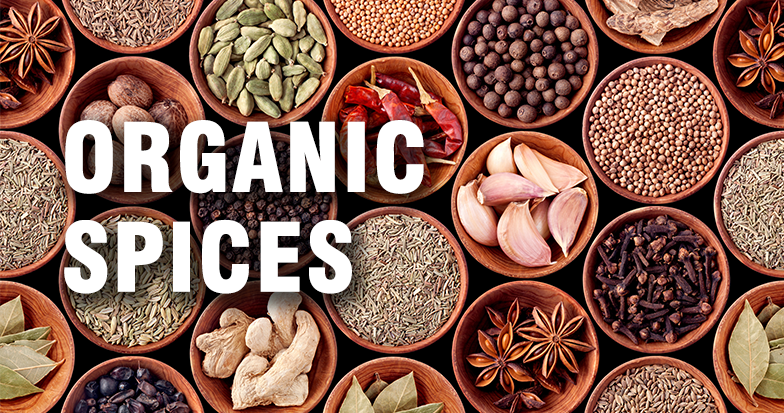
History of Spices in India –
Spices have been closely associated with cultural traditions, magic, preservation, medicine and embalming since early human history. Around 7000 years ago and far before the Greek and Roman civilizations came into being, Indian spices were a key component of its external trade with the lands of Mesopotamia, China, Sumeria, Egypt, and Arabia along with perfumes and textiles. The clove finds a mention in the Ramayana and even in writings dating back to the Roman Empire in the 1st century AD.
The World Spice Congress
World Spice Congress organized by the Spice board of India has evolved into a global platform for discussion and interaction between importers, exporters, regulators and other stakeholders of the spice industry. WSC 2016 says that “The world is experiencing rapid changes in food safety issues as health authorities globally have embarked on a mission to make food safer for their countrymen”. India’s internal food laws are now equally stringent. Are these new changes practical or Utopian? WSC 2016 will deliberate extensively on this as well as other issues and also bring the delegates up to speed on how India plans to make its food chain safe, reliable, consistent and most importantly – sustainable.
WCG in its 2016 meet has declared that It will also explore feasible ideas and methods to help implement the concept of “Grow with India”. Policy makers and spice companies will together thrash out measures to assure the safe and clean delivery of spices on a consistent basis and in the most practical manner.
The Importance of Organic in Spices –
Thomas Fricke, co-founder and president of ForesTrade says that “Virtually all conventional spices sold in the United States are fumigated [sterilized] with hazardous chemicals that are banned in Europe, and they may be produced in a manner that is destructive to the ecosystems where they’re grown.
As a consequence, spices may be contaminated with pesticide residues and with genetically modified ingredients. But at 24 Mantra Organic, we give you an assurance that all our spices are pure and 100% free of chemicals and any type of adulteration. Our spices are earth’s chosen companions. Yes, our farmers use the earth to endow the spices with natural goodness. This approach gives our range of spices unrivaled and rich aromatic properties. Minimal processing and the adherence to purity standards means that the spices you buy from will certainly add the right, pure spice to your food and life!
Rich in antioxidants and aromatic oils. Grown to preserve natural aromas and flavors. That’s the mantra within our spices. Savour them all as we have all the spice that you require in your day to day cooking.
Given below are a few fun facts for all of you to note when it comes to these spices and why they are so special –
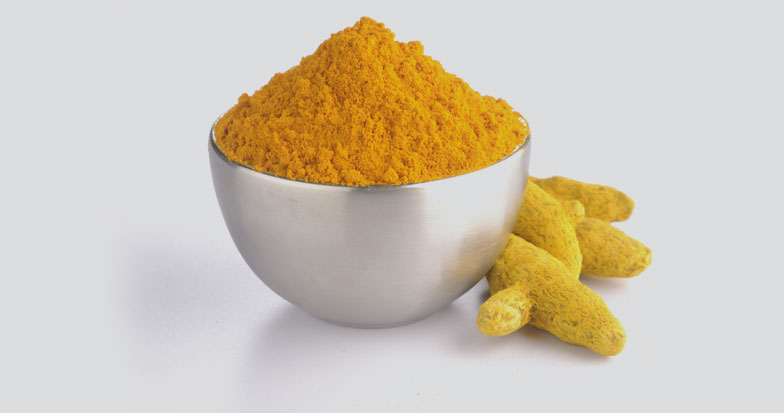 Turmeric Powder – Turmeric is a herbaceous perennial plant in the ginger family. It’s native to India and the root is a common component of Indian cooking – especially in curries. The root is boiled, dried and ground into a yellow-orange spice powder before use. It has an earthy, peppery flavour. The health benefits of turmeric are innumerable, but check out this article to know more about the various health benefits of turmeric.
Turmeric Powder – Turmeric is a herbaceous perennial plant in the ginger family. It’s native to India and the root is a common component of Indian cooking – especially in curries. The root is boiled, dried and ground into a yellow-orange spice powder before use. It has an earthy, peppery flavour. The health benefits of turmeric are innumerable, but check out this article to know more about the various health benefits of turmeric.
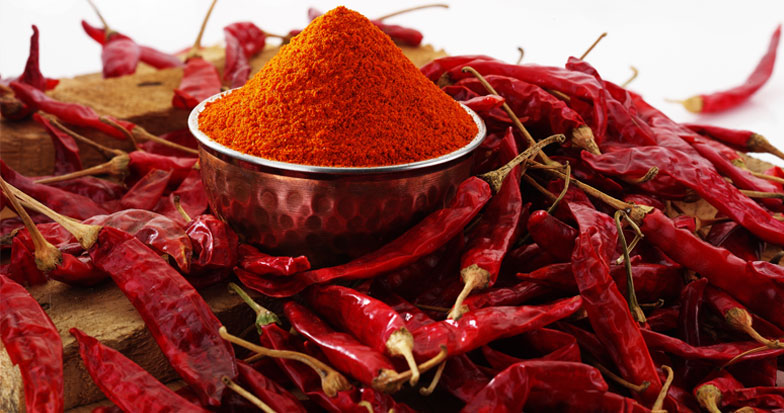 Chili Powder – the dried, pulverized fruit of one or more varieties of chili pepper, sometimes with the addition of other spices. It is used as a spice to add pungency or piquancy and flavor to dishes. Chili powder is sometimes known by the specific type of chili pepper used (such as cayenne pepper). It is used in many different cuisines, including Tex-Mex, Indian, Chinese, Thai, and Korean.
Chili Powder – the dried, pulverized fruit of one or more varieties of chili pepper, sometimes with the addition of other spices. It is used as a spice to add pungency or piquancy and flavor to dishes. Chili powder is sometimes known by the specific type of chili pepper used (such as cayenne pepper). It is used in many different cuisines, including Tex-Mex, Indian, Chinese, Thai, and Korean.
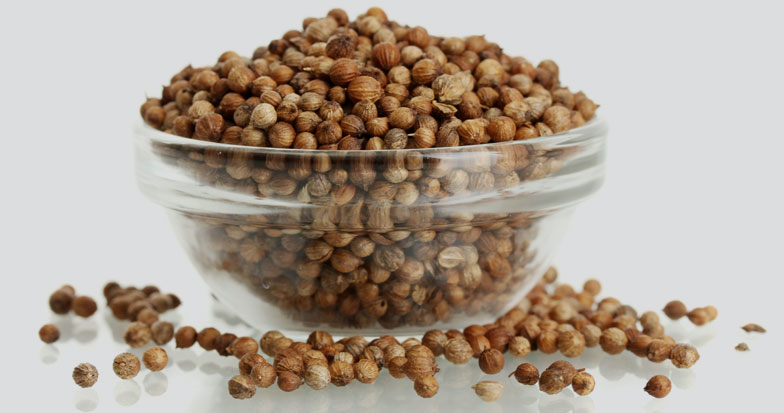 Coriander Seed – Coriander is a small, hollow-stemmed plant in the Apiaceae family, in the genus: Coriandum. Its scientific name is Coriandum sativum. Pleasant, aromatic and spicy, its seeds have been found utility since ancient times in cooking as well as in various traditional medicines. Coriander is native to South-Eastern Europe and grown extensively all over the Europe, Middle East, China, India, and Turkey.
Coriander Seed – Coriander is a small, hollow-stemmed plant in the Apiaceae family, in the genus: Coriandum. Its scientific name is Coriandum sativum. Pleasant, aromatic and spicy, its seeds have been found utility since ancient times in cooking as well as in various traditional medicines. Coriander is native to South-Eastern Europe and grown extensively all over the Europe, Middle East, China, India, and Turkey.
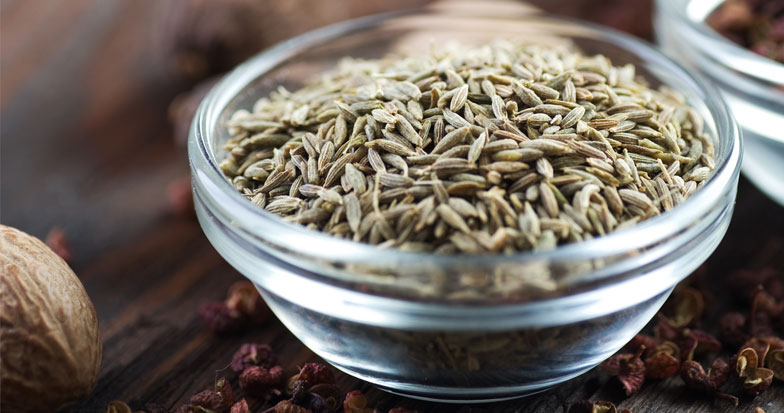 Cumin – Cumin, scientifically known as Cuminum Cyminum, belongs to family Apiaceae and is extensively used in culinary practices of the Indian Subcontinent. The health benefits of cumin include its ability to aid in digestion, improve immunity and treat piles, insomnia, respiratory disorders, asthma, bronchitis, common cold, lactation, anemia, skin disorders, boils and cancer.
Cumin – Cumin, scientifically known as Cuminum Cyminum, belongs to family Apiaceae and is extensively used in culinary practices of the Indian Subcontinent. The health benefits of cumin include its ability to aid in digestion, improve immunity and treat piles, insomnia, respiratory disorders, asthma, bronchitis, common cold, lactation, anemia, skin disorders, boils and cancer.
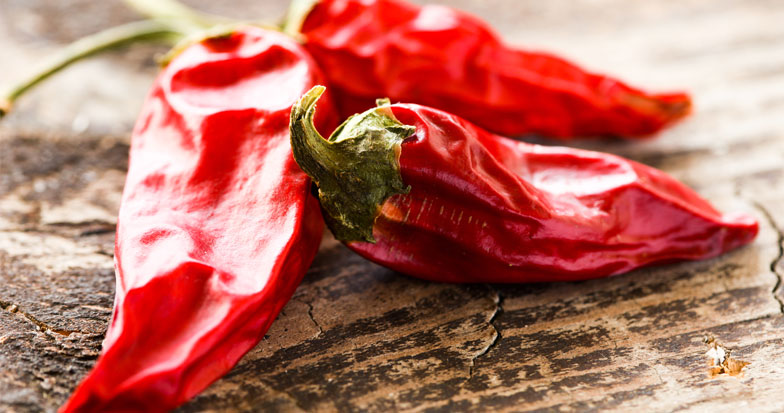 Red Chilli – Chili peppers, despite their fiery hotness, are one of the very popular spices known for their medicinal and health benefiting properties. The chili, actually, is a fruit pod from the plant belonging to the nightshade family (Solanaceae), within the genus, capsicum. Chilies contain health benefiting an alkaloid compound in them, capsaicin, which gives them strong spicy pungent character. They are a rich source of Vitamin-C. They are also good in other antioxidants such as vitamin-A, and flavonoids like ß-carotene, a-carotene, lutein, zea-xanthin, and cryptoxanthin. Last but not the least Chili peppers have amazingly high levels of vitamins and minerals.
Red Chilli – Chili peppers, despite their fiery hotness, are one of the very popular spices known for their medicinal and health benefiting properties. The chili, actually, is a fruit pod from the plant belonging to the nightshade family (Solanaceae), within the genus, capsicum. Chilies contain health benefiting an alkaloid compound in them, capsaicin, which gives them strong spicy pungent character. They are a rich source of Vitamin-C. They are also good in other antioxidants such as vitamin-A, and flavonoids like ß-carotene, a-carotene, lutein, zea-xanthin, and cryptoxanthin. Last but not the least Chili peppers have amazingly high levels of vitamins and minerals.
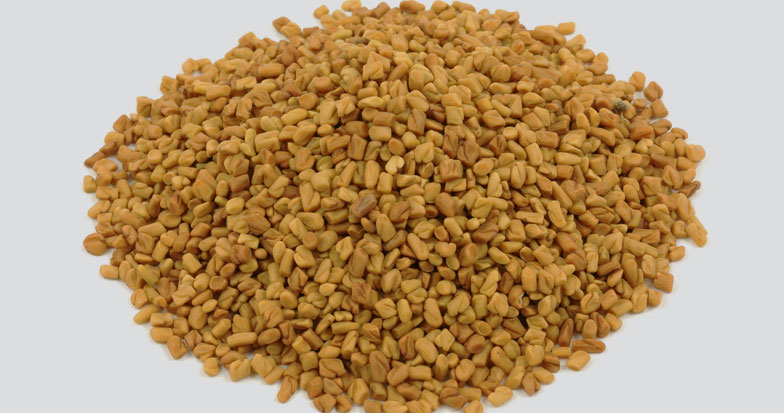 Fenugreek – fenugreek is an herb with light green leaves and small white flowers. it’s of the pea family (Fabaceae) and also known as greek hay (trigonella foenum-graecum). fenugreek seeds have a somewhat bitter taste, similar to celery, maple syrup or burnt sugar, and are often used to make medicine. however, fenugreek has a far more pleasant taste when cooked. some of the benefits of fenugreek are that it improves digestive problems and cholesterol levels, reduces inflammation inside the body and adds flavor and spice to food
Fenugreek – fenugreek is an herb with light green leaves and small white flowers. it’s of the pea family (Fabaceae) and also known as greek hay (trigonella foenum-graecum). fenugreek seeds have a somewhat bitter taste, similar to celery, maple syrup or burnt sugar, and are often used to make medicine. however, fenugreek has a far more pleasant taste when cooked. some of the benefits of fenugreek are that it improves digestive problems and cholesterol levels, reduces inflammation inside the body and adds flavor and spice to food
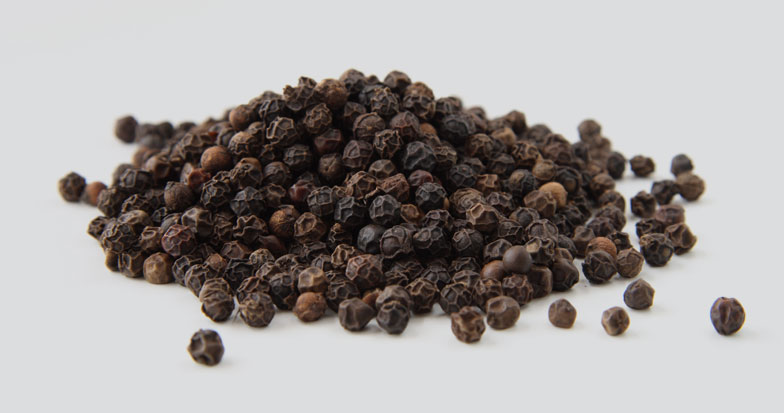 Black Pepper –It belongs to the Piperaceae family, and is processed in different ways to yield different kinds of peppers. While pepper originally belongs to South India, it’s grown in other tropical countries as well. It’s played a vital role in history and has been considered as an important spice. Some of the benefits of Black pepper are it stimulates digestion, relieves cold and cough, enables weight loss & improves skin.
Black Pepper –It belongs to the Piperaceae family, and is processed in different ways to yield different kinds of peppers. While pepper originally belongs to South India, it’s grown in other tropical countries as well. It’s played a vital role in history and has been considered as an important spice. Some of the benefits of Black pepper are it stimulates digestion, relieves cold and cough, enables weight loss & improves skin.
 Cinnamon – Cinnamon is a powerful spice that has been used medicinally around the world for thousands of years. Some of the benefits of Cinnamon are it is a high source of antioxidants, protects heart health, fights diabetes, help lower cancer risk, protects dental health & freshens breath naturally.
Cinnamon – Cinnamon is a powerful spice that has been used medicinally around the world for thousands of years. Some of the benefits of Cinnamon are it is a high source of antioxidants, protects heart health, fights diabetes, help lower cancer risk, protects dental health & freshens breath naturally.
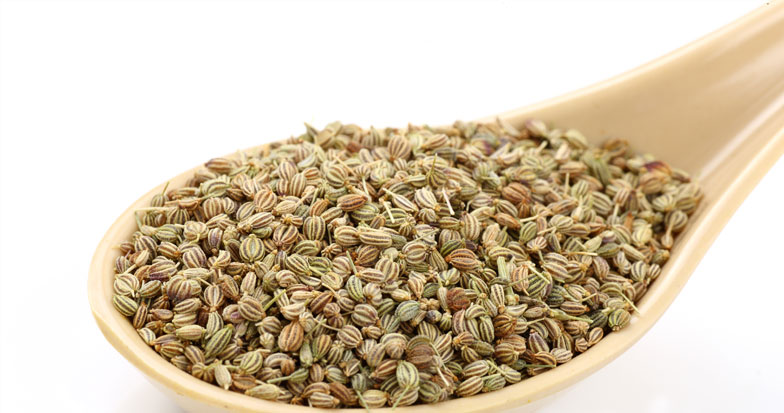 Carom Seeds or Ajwain – Carom seeds are also known as ajwain belongs to the same family as fennel, anise, dill, and caraway. Nutritional Value of Carom Seeds and Its Oil are immense like tackling acidity, kidney disorders, asthma, liver and kidney health and many other health benefits.
Carom Seeds or Ajwain – Carom seeds are also known as ajwain belongs to the same family as fennel, anise, dill, and caraway. Nutritional Value of Carom Seeds and Its Oil are immense like tackling acidity, kidney disorders, asthma, liver and kidney health and many other health benefits.
 Fennel – Fennel is crunchy and slightly sweet, adding a refreshing contribution to the ever popular Mediterranean cuisine. Fennel Contains Unique Phytonutrients with Antioxidant and Health-Promoting Effects. Apart from this, it is a very good source of fiber, fennel bulb may help to reduce elevated cholesterol levels. And since fiber also removes potentially carcinogenic toxins from the colon, fennel bulb may also be useful in preventing colon cancer.
Fennel – Fennel is crunchy and slightly sweet, adding a refreshing contribution to the ever popular Mediterranean cuisine. Fennel Contains Unique Phytonutrients with Antioxidant and Health-Promoting Effects. Apart from this, it is a very good source of fiber, fennel bulb may help to reduce elevated cholesterol levels. And since fiber also removes potentially carcinogenic toxins from the colon, fennel bulb may also be useful in preventing colon cancer.
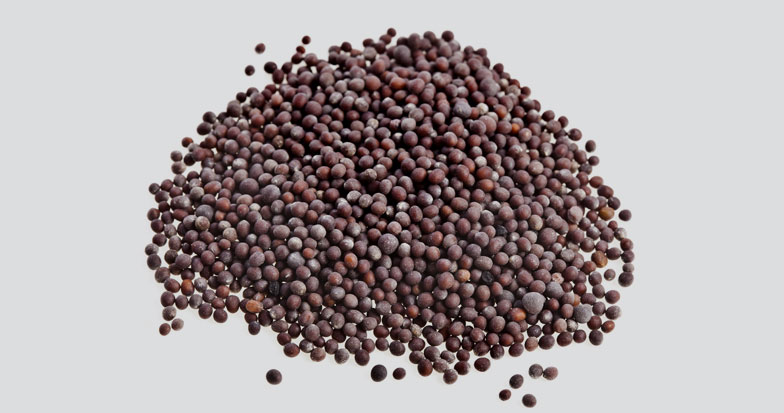 Mustard Seeds – Mustard seeds have been highly prized culinary oil-seeds being in use since earlier times. The seeds are fruit pods obtained from a mustard plant, in the Brassica family. Some of the close members of mustards in this family include cabbage, broccoli, brussels-sprouts, etc. Scientific name: Brassica juncea. Generally perceived as health benefiting spice, mustard seeds are indeed very rich in phyto-nutrients, minerals, vitamins and anti-oxidants. Being one of the chief oil seeds, mustards are indeed very high in calories.
Mustard Seeds – Mustard seeds have been highly prized culinary oil-seeds being in use since earlier times. The seeds are fruit pods obtained from a mustard plant, in the Brassica family. Some of the close members of mustards in this family include cabbage, broccoli, brussels-sprouts, etc. Scientific name: Brassica juncea. Generally perceived as health benefiting spice, mustard seeds are indeed very rich in phyto-nutrients, minerals, vitamins and anti-oxidants. Being one of the chief oil seeds, mustards are indeed very high in calories.
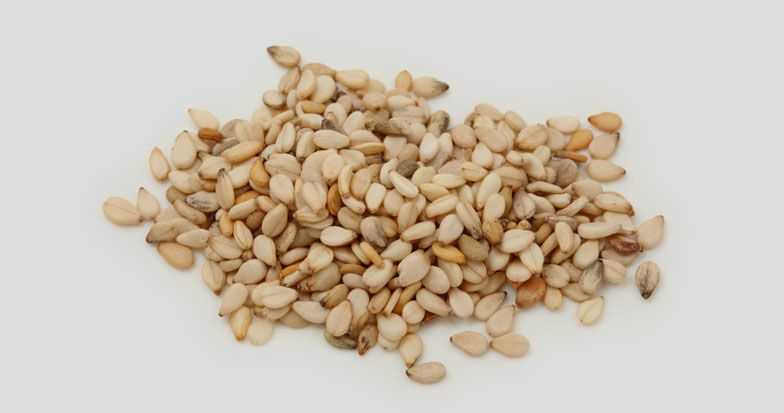 White Sesame – Sesame seeds may be tiny, but they have huge health benefits. They were worth their weight in gold during the Middle Ages, and for many good reasons. Sesame seeds are full of high-quality protein, they contain magnesium and other nutrients, helps lower blood pressure in diabetics, lower cholesterol levels, helps in digestion and a lot more.
White Sesame – Sesame seeds may be tiny, but they have huge health benefits. They were worth their weight in gold during the Middle Ages, and for many good reasons. Sesame seeds are full of high-quality protein, they contain magnesium and other nutrients, helps lower blood pressure in diabetics, lower cholesterol levels, helps in digestion and a lot more.
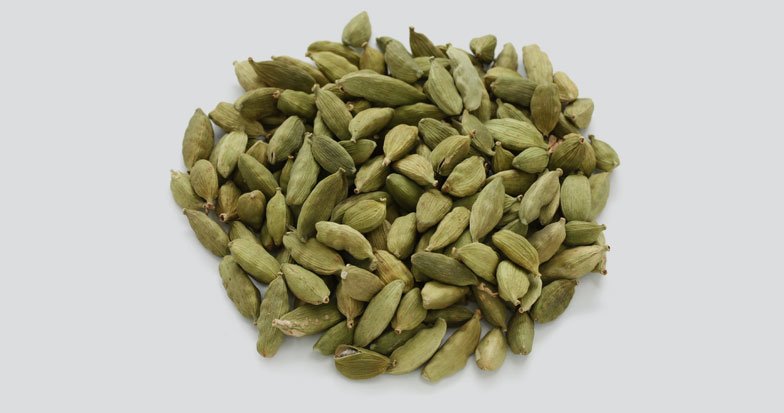 Cardamom – Cardamom is a spice that originated in India, Nepal, and Bhutan. Today, it is available in most tropical places in Asia, including India, China, Bhutan, Vietnam, Malaysia, Korea, and Japan. The health benefits of cardamom include gastrointestinal protection, cholesterol control, control of cancer, relief from cardiovascular issues, and the improvement of blood circulation in the body. It is useful for curing dental diseases and urinary tract infections such as cystitis, nephritis, and gonorrhea.
Cardamom – Cardamom is a spice that originated in India, Nepal, and Bhutan. Today, it is available in most tropical places in Asia, including India, China, Bhutan, Vietnam, Malaysia, Korea, and Japan. The health benefits of cardamom include gastrointestinal protection, cholesterol control, control of cancer, relief from cardiovascular issues, and the improvement of blood circulation in the body. It is useful for curing dental diseases and urinary tract infections such as cystitis, nephritis, and gonorrhea.
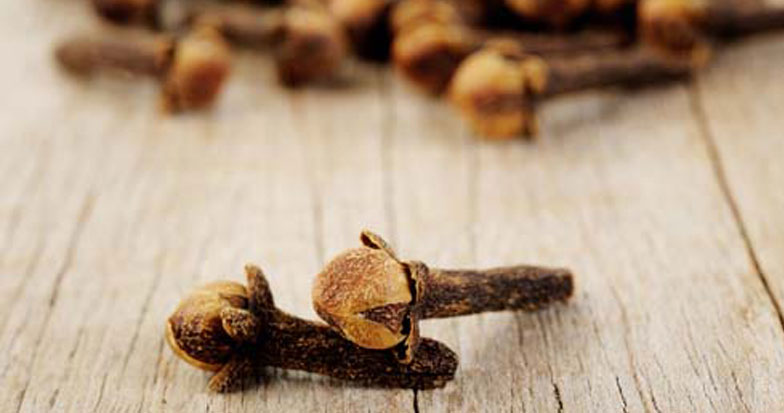 Cloves – Cloves are one of the spices indigenous to Asian countries like Indonesia, India, Pakistan, and even areas of East Africa. Cloves offer many health benefits, some of which include providing aid in digestion, having antimicrobial properties, fighting against cancer, protecting the liver, boosting the immune system, controlling diabetes, preserving bone quality, and containing anti-mutagenic properties, as well as fighting against oral diseases and headaches, while displaying aphrodisiac properties as well.
Cloves – Cloves are one of the spices indigenous to Asian countries like Indonesia, India, Pakistan, and even areas of East Africa. Cloves offer many health benefits, some of which include providing aid in digestion, having antimicrobial properties, fighting against cancer, protecting the liver, boosting the immune system, controlling diabetes, preserving bone quality, and containing anti-mutagenic properties, as well as fighting against oral diseases and headaches, while displaying aphrodisiac properties as well.
References
- http://www.worldspicecongress.com/index.php/site/AboutUs
- https://www.organicconsumers.org/old_articles/Organic/spicesgood.php
- https://www.healthambition.com/health-benefits-ginger-turmeric-tea/
- http://www.nutrition-and-you.com/coriander-seeds.html
- https://en.wikipedia.org/wiki/Chili_powder
- https://www.organicfacts.net/health-benefits/seed-and-nut/health-benefits-of-cumin.html
- http://www.nutrition-and-you.com/chili-peppers.html
- https://draxe.com/fenugreek/
- http://food.ndtv.com/opinions/black-pepper-benefits-more-than-just-a-spice-1238993
- https://draxe.com/health-benefits-cinnamon/
- http://www.stylecraze.com/articles/amazing-benefits-of-carom-seeds-for-skin-hair-and-health/
- http://www.nutrition-and-you.com/mustard-seeds.html
- http://www.whfoods.com/genpage.php?tname=foodspice&dbid=23
- http://www.care2.com/greenliving/20-health-benefits-of-sesame-you-wont-believe.html
- https://www.organicfacts.net/health-benefits/herbs-and-spices/health-benefits-of-cloves.html
- https://www.organicfacts.net/health-benefits/herbs-and-spices/health-benefits-of-cardamom.html



Recent Comments